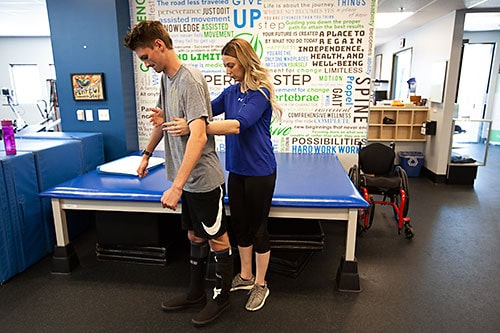Long walk to commencement

It’ll be a big moment for the roughly 580 kids who will receive their diplomas next week at Claremont High School’s graduation, but perhaps none will feel the emotional heft of the experience quite as profoundly as Alexander Harris.
The 18-year-old will step across the stage, take his hard-earned degree, smile for the obligatory photo, and acknowledge the cheers from his friends and family. But that first bit—walking across the stage—will be imbued with immeasurable significance to him and a family that has grown to include scores of medical professionals since they all became acquainted on August 19, 2018.
That was the date Alexander—or “Al” as he’s affectionately known—was severely injured while making his professional motocross racing debut. He was mid-jump when his foot got caught, tearing him off the bike and over the handlebars. He knew it was bad, he said, when he hit the ground and felt nothing.

But Al was determined to get back on his feet. When the COURIER talked to him last November, he had set a goal of walking across the stage at his graduation. And next Thursday, after some 10 months of intense daily physical therapy, he will make good on that promise.
“He’s made amazing progress,” said his mother, Peggy Harris. “He still uses a wheelchair to get around, but he can walk with a walker now, and he can use hand crutches to walk short distances. It’s amazing.”
That superlative—amazing—is thrown around quite a bit by folks discussing Al’s remarkable recovery.
“When he came in, it was a very severe spinal cord injury,” said Dr. Minasian, who, along with many of Al’s physical therapists, doctors and nurses, will attend his graduation ceremony on Thursday.
“He had no movement in his legs, very minimal movement in his hands, and no movement in his arms. I think the support from his family and the medical team has been really helpful to him, but also just within himself, his own will to get better. That has been amazing to see.
“I told him it would make my year if I could see him walk across the stage [at graduation],” Dr. Minasian said.
Neurosurgeons use a classification score from A, denoting the very worst kind of injury, to E, meaning only superficial damage exists, to assess spinal cord injuries. Al’s injury was a B.
“He had a very low chance of being able to regain neurologic function, not even discussing walking,” said Dr. Minasian.
He had a fracture dislocation of his spine and spinal cord. The six-hour surgery involved making an incision in the front of his neck, removing the shattered bone and relieving pressure on his spinal cord. A titanium “cage” and plate were then placed in the spot where the shattered bone had once been.
Al’s recovery has been aided by a small army of professionals. But the lion’s share of the credit goes to one extremely strong, determined young man.
“We tracked his progress throughout,” Dr. Minasian said. “A couple days after surgery, he was already opening and closing his hand, which is big, because he hadn’t had any movement there.”
A month or two after surgery, he was lifting his arms all the way up, Dr. Minasian shared. And the next time he came in, he was walking.
“We all cried when we saw him walking in the clinic,” Dr. Minasian recalled. “I was taking video, and it’s so funny because I’m crying and moving the camera. I wasn’t able to maintain my composure. Tracking that kind of progress has been amazing to see.”
The daily work Al puts in at Casa Colina in Pomona and at The Perfect Step in Claremont, coupled with the unwavering support of his family and medical team, has not only paid dividends for him, but is now benefitting other young people who have suffered spinal cord injuries.
“It’s cool to see a teenager have that kind of strong minded will within him,” Dr. Minasian said. “You don’t often see that. I actually use his story to help my other patients that are in similar situations. I use him as an inspiration for the other kids.”
Al is enrolled at Citrus College, where he’ll begin taking classes in the fall, studying to become a personal trainer. “I’m looking forward to it,” he said. “It’s kind of new, but it’s always kind of been there. It’s been a plan B.”
Plan A was to race professionally. “Since after the accident, I’ve wanted to do it more. So that’s my main plan, to train racers and riders. That’s the main reason why I want to do it.”
Graduation day will be particularly poignant for Peggy Harris.
“I have a hard time keeping it together, period,” Al’s mom said. “It’s been an emotional rollercoaster. You’re so happy he’s doing so well, but then you’re like, ‘oh man, this isn’t what we thought he’d be doing at this time in life.’ But we’re thankful too for where he’s at, because it could be so much worse. Maybe we’ll see a tear from Al. I don’t think he’s ever cried.”
After graduation, the family—likely including their extended clan of doctors and therapists—will enjoy a celebratory dinner.
“I think there’s going to a very large group of people there for Al,” Ms. Harris said. “We’re going to be having a party for him on Saturday too, and that’s gotten a little out of control. There’s so many people and friends. We’re just so lucky.”
—Mick Rhodes
mickrhodes@claremont-courier.com








0 Comments